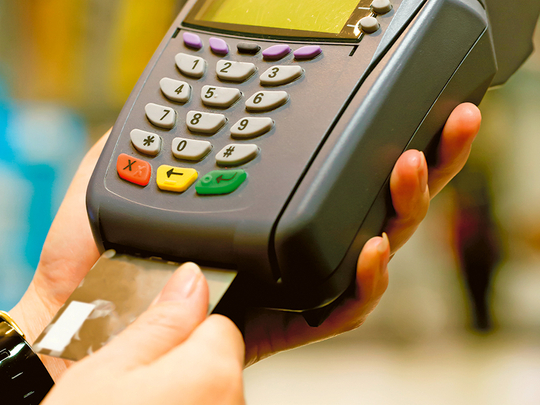
Despite concerns of weaker consumer spending amid slowing economic growth, earnings of banks and card issuers reveal that people continue to swipe their credit cards at a healthy clip in the UAE and the wider region.
MasterCard, the second-largest payments network in the world, posted profit that beat analysts’ estimates as card spending climbed in the US and Asia. Purchase volumes in the Asia-Pacific, Middle East and Africa (APMEA) rose to $237 billion (Dh870.3 billion) in the third quarter compared with $228 billion in the same period last year, GN Focus can reveal. At the end of September, more than three billion purchase transactions were made compared to 2.5 billion in the third quarter of 2014.
“What this means is that our business is performing well and you can see that in our volume and transaction growth,” says Raghu Malhotra, promoted as MasterCard’s President, Middle East and Africa, on November 3. “We are pleased with the results achieved this quarter, despite the ongoing uncertainty in the global economy due to continued lower oil and commodity prices. The underlying fundamentals of our business remain unchanged and our growth momentum continues.”
Within the Middle East and North Africa, “Saudi Arabia and the UAE are among the fastest-growing markets”, says Malhotra. “In the UAE alone, this year, we’ve recorded over $8.6 billion total spend.”
Consumer spending in the UAE in general has remained strong, and card use has accelerated, according to Visa Inc., the world’s largest payment network. “Credit-card spending in the UAE continues to look healthy, with potential for expansion as consumers shift from cash-based transaction to electronic payments,” says Fabio De Grazia, Visa Head of Core Products, Mena. Results from Visa’s latest Ramadan and Eid Spend Report in September show that in the UAE, the total payment volumes on Visa cards exceeded $2.9 billion during the month. Across the region, Visa debit, prepaid and credit cardholders spent nearly $4 billion during the holy month and Eid.
Concerns that credit-card spending is slowing come as deposits shrink at UAE lenders in the third quarter in the latest sign that the low oil price has started to be felt by the banking sector. Deposits shrank marginally by 0.45 per cent in the three months to September, to Dh1.43 billion, down from Dh1.44 billion in June, according to Central Bank data published on November 1. That is the second consecutive quarter of falling deposits. Credit growth continued to slow in the third quarter, growing 2.1 per cent, down from 2.5 per cent at the end of June. Credit grew at 7 per cent in the 12 months to September — slower than the 8.8 per cent growth recorded in the 12 months to June.
Slowing economic growth, falling oil and the strong dollar have not impacted credit-card spending at Abu Dhabi Islamic Bank (ADIB), says Philip King, Head of Retail Banking at the UAE’s second-biggest Sharia-compliant lender. “Despite the economic circumstances, credit-card spending continued to increase in 2015.” Purchase volumes on credit cards rose 30 per cent in average monthly retail spend in 2015 compared to 2014, while the size of transactions increased by 41 per cent, says King. ADIB recorded Dh503.2 million in net profits in the third quarter of this year, marking a 5.5 per cent year-on-year increase.
For Dubai’s largest lender, Emirates NBD, the impact of macroeconomic challenges has so far been limited. “We recognise the headwinds that recent regional liquidity, a strong dollar and low oil price can present,” says Suvo Sarkar, Senior Executive Vice-President and Group Head — Retail Banking and Wealth Management, Emirates NBD. “[However, we continue to see] strong growth in credit-card spends and balances,” he says, declining to reveal specific numbers.
Emirates NBD reported a nine-month net profit of Dh5 billion up 27 per cent compared to same period last year, driven by growing credit-card volumes, foreign exchange and derivative income, and higher asset management fees.
Consumer confidence in the UAE continues to remain strong despite the tepid economic situation, says Mohsin Aikal, Head of Consumer Finance, at Noor Bank. “Credit-card transactions are on the rise and are up close to 5 per cent compared
to the same period last year. The current economic conditions have not had any material impact on credit-card spends in the UAE.”
Noor Bank expects new credit-card issuance and spend volumes to grow more than 50 per cent this year, says Aikal. The bank has been able to grow much faster than the market as it is a late entrant and has a much smaller credit-card customer base. “Despite the macroeconomic challenges and lower deposits with the banks in the UAE, consumer lending has remained healthy and will post a double-digit percentage growth,” he says.
For UK lender Standard Chartered, the UAE continues to be its biggest market in Mena in terms of revenue and portfolio size and “is our key growth engine”, says, Shehzad Hameed, Head of Retail Banking UAE. “We have witnessed consistent credit-card acquisition growth since 2014 and significant growth in our spend levels,” he says, declining to provide specific numbers.












